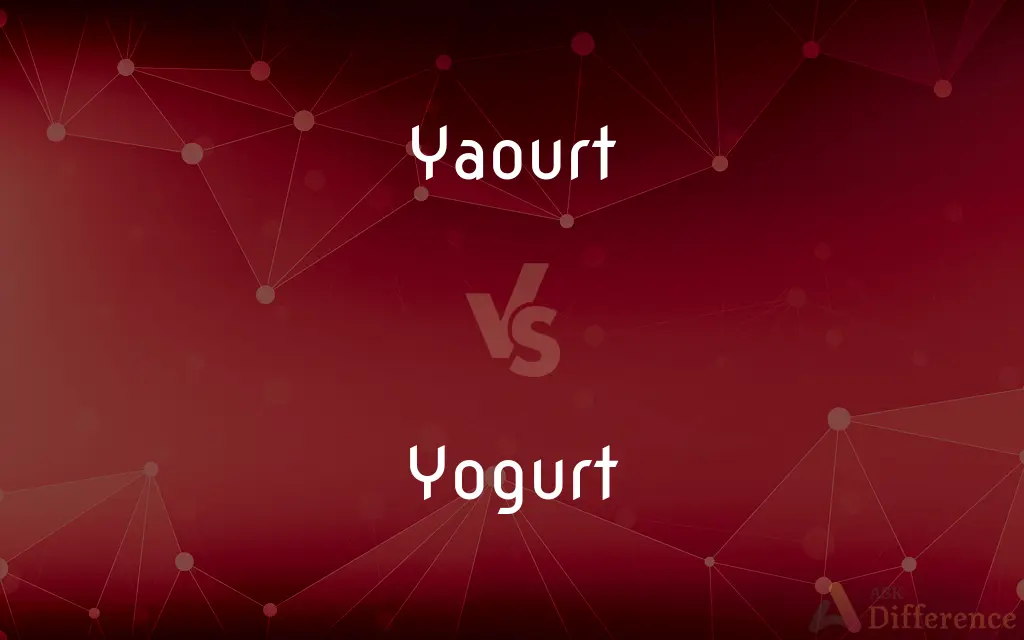Yaourt vs. Yogurt — What's the Difference?
By Fiza Rafique & Urooj Arif — Updated on May 9, 2024
Yaourt is a French-style yogurt known for its creamy texture and artisanal methods, while yogurt is a broader category with various textures and cultures.

Difference Between Yaourt and Yogurt
Table of Contents
ADVERTISEMENT
Key Differences
Yaourt is typically made using traditional techniques in small batches, which can lead to a richer and creamier texture. Yogurt, on the other hand, includes a wide range of products from Greek to regular, varying significantly in texture from firm to quite fluid.
Yaourt often emphasizes the use of whole milk and active live cultures specific to French culinary traditions, whereas yogurt can be made from all types of milk, including whole, low-fat, and non-dairy alternatives.
The flavor profile of yaourt tends to be more refined and less tart, highlighting its artisanal origins. Yogurt generally has a more pronounced tanginess, which can vary widely depending on the specific cultures used in its production.
Yaourt is less commonly found in conventional grocery stores outside of France, making it a more niche choice for yogurt enthusiasts. Yogurt is widely available globally, offered by many brands with a variety of flavors and textures.
In terms of health benefits, yaourt is praised for its probiotics and minimal processing. Yogurt also offers probiotic benefits, but its nutritional content can vary depending on the additives such as sugar and artificial flavors.
ADVERTISEMENT
Comparison Chart
Origin
France, artisanal
Global, various styles
Milk Type
Primarily whole milk
Whole, low-fat, non-dairy options
Texture
Creamy, thick
Ranges from liquid to thick
Flavor
Less tart, subtle
Generally tart, flavor varies
Availability
More niche, mainly in specialty stores
Widely available in many varieties
Compare with Definitions
Yaourt
Often uses whole milk for a richer taste.
The creaminess of this yaourt comes from the high-quality whole milk used.
Yogurt
A fermented dairy product available in many variations.
For breakfast, she chose a Greek yogurt with live cultures.
Yaourt
Primarily found in specialty or artisanal food shops.
She found authentic French yaourt at a boutique dairy shop.
Yogurt
Can be made from different types of milk.
They offer a wide range of yogurts, including almond milk versions.
Yaourt
A French variant of yogurt, known for its smooth texture.
I enjoyed a delicious bowl of yaourt topped with honey and almonds.
Yogurt
Available in many flavors and brands.
The grocery store has a yogurt to satisfy everyone's taste, from plain to exotic mango.
Yaourt
Traditionally made in small batches.
The yaourt at the local market is made using only traditional methods.
Yogurt
Known for its probiotic benefits.
Eating yogurt daily can help maintain your digestive health.
Yaourt
Less tart than many yogurts.
He prefers yaourt for its mild flavor that pairs well with fruits.
Yogurt
Textures vary from drinkable to Greek-style thick.
He likes his yogurt thick and creamy, so he always buys Greek yogurt.
Yaourt
A liquor fermented from milk, originally by the Turks.
Yogurt
A custardlike food with a tart flavor, prepared from milk curdled by bacteria, especially Lactobacillus bulgaricus and Streptococcus thermophilus, and often sweetened or flavored.
Yaourt
A fermented drink, or milk beer, made by the Turks.
Yogurt
Yogurt (UK: ; US: , from Turkish: yoğurt) also spelled yoghurt, yogourt or yoghourt, is a food produced by bacterial fermentation of milk. The bacteria used to make yogurt are known as yogurt cultures.
Yogurt
A semi-solid sourish food prepared from milk fermented by added bacteria, often sweetened and flavoured
Low-fat yogurt
Frozen yogurts
Yogurt
A milk-based product stiffened by a bacterium-aided curdling process, and sometimes mixed with fruit or other flavoring.
Yogurt
Any similar product based on other substances (e.g. soy yogurt).
Yogurt
A custard-like food made from curdled milk
Common Curiosities
Can yaourt be made with non-dairy milks?
Traditionally, yaourt is dairy-based, but there are artisanal producers who may offer non-dairy versions made with almond or coconut milk.
How does the production of yaourt and yogurt differ?
Yaourt production often involves traditional, artisanal methods and may include slow fermentation at lower temperatures compared to more commercially produced yogurt.
Are there any culinary uses specific to yaourt?
In French cuisine, yaourt is often used in baking and desserts for its smooth texture and subtle flavor.
What types of yogurt are most similar to yaourt?
Yogurts that are creamy and less tart, such as some types of Balkan or set style yogurts, are most similar to yaourt.
Does yaourt contain more sugar than regular yogurt?
Not necessarily; yaourt is usually less sweetened than some commercial yogurts, focusing more on the natural flavors of the milk and cultures.
Can lactose-intolerant individuals consume yaourt?
Those with lactose intolerance should be cautious as yaourt, like other dairy yogurts, contains lactose, although the fermentation process can reduce its levels.
How should yaourt be stored?
Yaourt should be stored in the refrigerator and consumed by the date on the package to ensure its freshness and probiotic benefits.
What are the key ingredients in yaourt?
Yaourt is typically made with whole milk and specific live cultures that are common in French dairy products.
Is yaourt suitable for a vegetarian diet?
Yes, yaourt, like most yogurts, is suitable for vegetarians as it is primarily made from milk and bacterial cultures.
What is the shelf life of yaourt compared to yogurt?
Yaourt typically has a similar shelf life to other fresh yogurts, which can last up to several weeks in the refrigerator.
Is there a cost difference between yaourt and yogurt?
Yes, yaourt may often be more expensive than mass-produced yogurts due to its artisanal production methods.
Why might someone choose yaourt over other types of yogurt?
Someone might choose yaourt for its creamier texture, less tart flavor, and artisanal quality, particularly if they prefer gourmet or traditional dairy products.
What are the environmental impacts of producing yaourt compared to yogurt?
Artisanal products like yaourt can have different environmental impacts depending on their production methods, which may require less industrial processing but more intensive dairy farming.
Can yaourt be used as a substitute for sour cream or crème fraîche in recipes?
Yes, due to its creamy texture and mild flavor, yaourt can often be used as a substitute for sour cream or crème fraîche in many recipes.
How do the probiotic benefits of yaourt compare to those of yogurt?
Yaourt and yogurt both contain beneficial probiotics, but the specific strains and their effects can vary, with some artisanal yaourts possibly having more unique or diverse cultures.
Share Your Discovery

Previous Comparison
Mistaken vs. Mistook
Next Comparison
Liber vs. LibreAuthor Spotlight
Written by
Fiza RafiqueFiza Rafique is a skilled content writer at AskDifference.com, where she meticulously refines and enhances written pieces. Drawing from her vast editorial expertise, Fiza ensures clarity, accuracy, and precision in every article. Passionate about language, she continually seeks to elevate the quality of content for readers worldwide.
Co-written by
Urooj ArifUrooj is a skilled content writer at Ask Difference, known for her exceptional ability to simplify complex topics into engaging and informative content. With a passion for research and a flair for clear, concise writing, she consistently delivers articles that resonate with our diverse audience.
















































